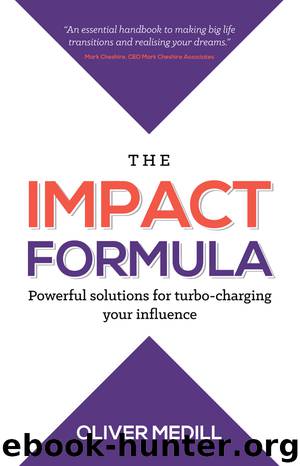The Impact Formula by Oliver Medill

Author:Oliver Medill
Language: eng
Format: epub
ISBN: 9781784521196
Publisher: Panoma Press Ltd
Step 2 – Research Your Audience
Ask yourself the following questions:
Who am I to be talking to them?
One of the most important questions to ask yourself from an audience perspective and once again it’s all about positioning. Of course you will know what you bring to the party, but building credibility and rapport at the start of your speech is as important as the subject matter itself. So, depending upon your audience’s age, experience etc., you need to remember to tell them why you are qualified to stand there, in as contextually relevant a way as possible and as fast as possible.
Why is my subject relevant to them? Where’s their pain and therefore what solution do I offer them?
A priceless question to ask yourself when looking to position your subject matter for your audience at the start of your speech.
What will they get out of my material?
This question is one of my favourites because whilst it will be perfectly obvious to you that your content and knowledge is precious, the value of your material should always be seen through your audience’s eyes. There are almost always assumptions that we make as speakers that presuppose our audience’s comprehension. Find an unbiased person to be your ‘guinea-pig’ and ask them to hold up their hand every time something is not clear. You may be surprised at the result. It’s also a brilliant question to ask yourself with regard to the start of your speech and positioning your subject matter.
Why them and why now?
More positioning here too, in that whilst the relevance of your speech to your audience is crystal clear to you, it needs spelling out to them, and preferably near the beginning.
What is their level of understanding?
Depending upon the situation, you may either know this instinctively from the context of the event in question or be able to find out from the event organisers an idea of the demographics of your audience.
What are their key issues?
This is once again driven by the context of the situation. However, as with the previous two questions, even if you do not have all the information you require, you can always ask the audience with a ‘I’m curious – can I get a show of hands if…’ or a ‘raise your hands if I’m right in thinking that…’ question.
What do we have in common?
This is generally an easier question to either answer or find out. You will normally be making a speech in a certain place at a certain time for a reason. From that, it’s a matter of simply asking yourself where the crossover lies between you and your audience. You might want to think about commonly held assumptions and beliefs as well as experience and skills that you may have in common with the audience.
What are their expectations of the presentation or speech?
Hopefully lower than the audience-focused speech that you are about to deliver.
The critical point to make here is that most speeches and presentations are ill-prepared and rarely come from the perspective of
Download
This site does not store any files on its server. We only index and link to content provided by other sites. Please contact the content providers to delete copyright contents if any and email us, we'll remove relevant links or contents immediately.
Nudge - Improving Decisions about Health, Wealth, and Happiness by Thaler Sunstein(7678)
Deep Work by Cal Newport(7040)
Principles: Life and Work by Ray Dalio(6383)
The Doodle Revolution by Sunni Brown(4729)
Factfulness: Ten Reasons We're Wrong About the World – and Why Things Are Better Than You Think by Hans Rosling(4723)
Eat That Frog! by Brian Tracy(4499)
Thinking in Bets by Annie Duke(4204)
Hyperfocus by Chris Bailey(4101)
Visual Intelligence by Amy E. Herman(3766)
Writing Your Dissertation in Fifteen Minutes a Day by Joan Bolker(3709)
Ogilvy on Advertising by David Ogilvy(3584)
Hidden Persuasion: 33 psychological influence techniques in advertising by Marc Andrews & Matthijs van Leeuwen & Rick van Baaren(3536)
How to Win Friends and Influence People in the Digital Age by Dale Carnegie & Associates(3534)
How to win friends and influence people by Dale Carnegie(3459)
The Pixar Touch by David A. Price(3419)
Schaum's Quick Guide to Writing Great Short Stories by Margaret Lucke(3361)
Deep Work: Rules for Focused Success in a Distracted World by Cal Newport(3216)
Work Clean by Dan Charnas(3100)
The Slow Fix: Solve Problems, Work Smarter, and Live Better In a World Addicted to Speed by Carl Honore(2990)
